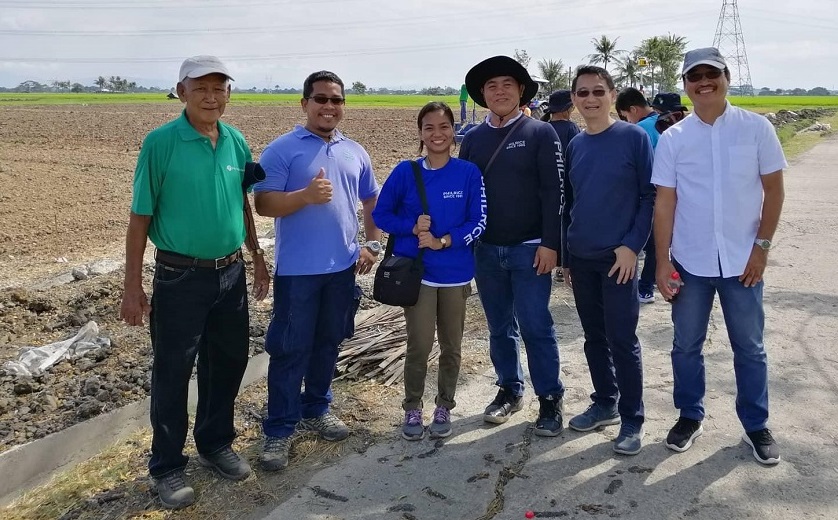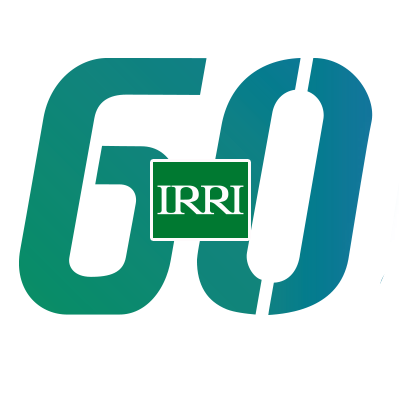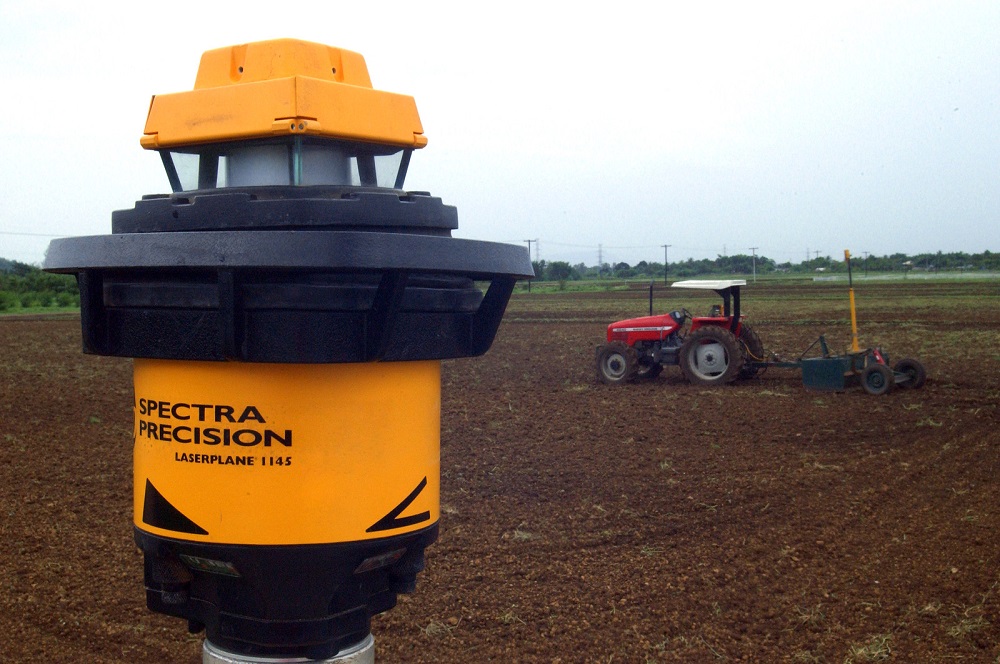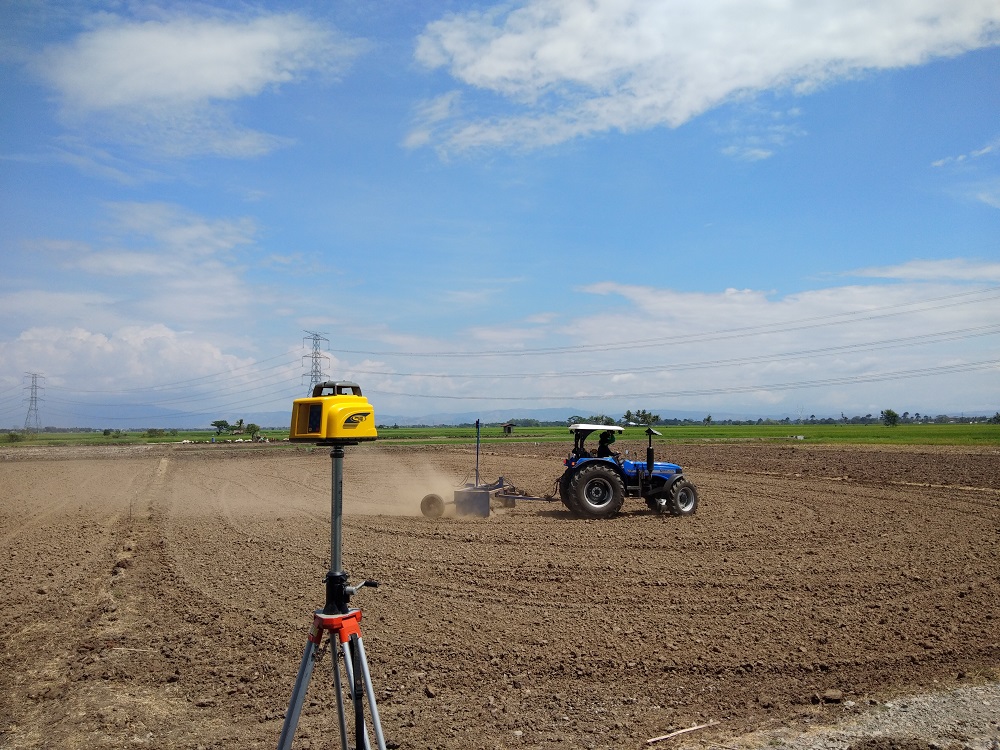A medical doctor who is also a farmer not only adopted the laser land leveling technology but piloted a service provision model for it—a first of its kind in the rice granary region of the Philippines. His story outlines the next steps that optimize partnership and active engagement of key players to ensure sustainable uptake of mechanization initiatives in the country.

From left to right: Mr. Benito Pablo, Engr. Sandro, Engr. Lea Caguiat, Dr. Bautista, Dr. Hernal Jr. and his cousin. (Photo courtesy of Dr. Hernal)
.
 Manolo Hernal Jr. is more than a medical doctor. Although he took an oath to treat the ill to the best of his ability, he also dons another frontliner’s hat: he is a rice farmer who manages their 24- hectare family farm.
Manolo Hernal Jr. is more than a medical doctor. Although he took an oath to treat the ill to the best of his ability, he also dons another frontliner’s hat: he is a rice farmer who manages their 24- hectare family farm.
“Making sure food is available is as essential as taking care of human life,” Dr. Hernal said.
As such, he finds tending their farm can be as challenging as patient care.
Access to adequate irrigation water has always been a problem on his farm in Sta. Rosa, in Nueva Ecija Province, known as the rice granary of the Philippines. It took 16 to 24 hours for him to irrigate a hectare and much of it was wasted because his field is not well-leveled.
“I have been looking for solutions for this,” Dr. Hernal said. “I did some research and read that laser land leveling could be a potential solution. Then I saw a post on Facebook about laser land leveling from Joseph Sandro of the International Rice Research Institute (IRRI). I contacted him and he invited me to a demonstration activity of WateRice at the Philippine Rice Research Institute (PhilRice).”
.
Sufficient rice with WateRice
WateRice (Water-efficient and risk-mitigation technologies for enhancing rice production in irrigated and rainfed environments) is a research-for-development project funded through the collaboration between the Philippine Department of Agriculture–Bureau of Agricultural Research (DA-BAR), PhilRice, and IRRI. Laser-guided land leveling is part of the water-saving technology package being promoted by the WateRice through Dr. Elmer Bautista of PhilRice and Engr. Sandro.
Land leveling using the laser system is a precision farming technology designed to be a faster and more effective alternative to manual leveling methods in ensuring a field has an even surface. In laser-leveled fields, the irrigation water reaches every part of the field, and uniformly covers the field. This reduces water losses from waterlogging, percolation, and runoff. The evenly distributed water also helps control weeds so farmers can reduce their use of herbicides. It also improves the nutrient use efficiency and promotes uniform crop growth and maturity.
Technology in action
In 2019, Dr. Hernal attended the WateRice demonstration on land leveling at the PhilRice Central Experiment Station in the Science City of Muñoz, Nueva Ecija. Upon witnessing the actual operation of land leveling using the laser-guided system, he immediately expressed his intention to purchase his own unit.
After exchanging information with Engr. Sandro, Dr. Hernal purchased a laser land leveling system from a recommended local distributor. Equipped with the knowledge from the WateRice hands-on demonstration, technical guidance from Engr. Sandro, online videos, IRRI hand-outs, training manuals, and briefing from the distributor of the machine, he converted his 4-hectare fish farm to a rice field and used the laser leveling system.
After two cropping seasons, Dr. Hernal observed a striking change in his farm and operation.
“It is faster to irrigate the field,” he said. “From 16-24 hours it only takes 4-8 hours now. It is also much easier to conduct farm operations. We have fewer bunds to maintain and clean.”
He also noticed a uniform ripening of his rice crop.
“I’m excited to see more benefits from the technology as I use it,” Dr. Hernal added.
Armed with his on-field experience from the previous planting season, Dr. Hernal decided to level the remaining 20 hectares of their farm. Ominously, the COVID-19 pandemic started in the country and threatened to deter his plans for planting for the next cropping season.
“But since my operator can finish leveling a hectare of land in, at most, two days we were able to finish leveling even when the entire province was placed under lockdown. We still manage to observe safe social distancing protocol,” he said.
If you offer the technology, they will come
“When I acquired the machine, I also wanted to make it profitable,” said Dr. Hernal. “I want to be a service provider for this machine to optimize its use.”
The doctor’s brother-in-law, who owns a 2.5-ha farm nearby, watched his laser land leveling operations. He eventually became the first client of Dr. Hernal’s laser leveling service at a rate of USD 31.00 per hour.
“I am the first to do this in the province or even the entire region,” he said and expects the demand for his leveling service will surge. “You don’t need to actively promote the technology. Once the client sees that they need it, they will immediately adopt it. I have been providing other services like mechanical transplanting to nearby farms.”
Adding laser leveling to his list completes his precise mechanized farming fleet.
“When we talk about modernizing farm operations, we should adopt the system as a whole,” he enthused. “I’m very much satisfied with the results of my leveled farm, but I would like to have more training like field surveying for improvement.”
As a satisfied user, he posted his leveled land on WateRice’s Facebook page. As a result, the group has been getting membership requests and inquiries almost daily.

(Photo by Ariel Javellana, IRRI)
.
Mechanization towards sustainable food systems
The challenge to modernize farms in the Philippines provides a motivation to the WateRice team to continuously seek mechanisms that will create sustainable service supply models for agricultural machines, including laser land leveling.
“Mechanization and land re-formation using laser leveling is an important driver towards enhancing the Philippine rice sector competitiveness,” said Dr. Manuel Jose Regalado, the chief science research specialist at PhilRice and co-project leader of WateRice. “We see the critical role of public and private partnerships in ensuring efficient uptake of water-saving technologies in the country.”
This also complements IRRI’s Mechanization and Postharvest Cluster initiatives in sustaining the institute’s mechanization agenda. IRRI continuously engages with the DA-Bureau of Agricultural and Fisheries Engineering, the agency mandated to oversee the Philippines’ agriculture and fisheries modernization plan.
“This is very much aligned with the goals of the country’s Rice Competitiveness Enhancement Fund Program and DA’s eight paradigms where the modernization of rice farms is one of the drivers for economic growth,” said Dr. Sudhir Yadav, water management expert at IRRI and WateRice project leader.
Laser land leveling technology is reaching new heights in terms of modernizing the Philippine rice sector. Farmers in the Visayan Region have successfully leveled hundreds of hectares of land using this technology. However, it is still essential to build new ways that will create optimal returns to scale in rice farming and ensure its uptake. IRRI, PhilRice, and other key players will continue to reach out to the private sector and policymakers to ensure an efficient and effective supply chain model for mechanization that will contribute significantly towards sustainable agri-food systems in the country.
___________________________
Ms. Quilloy is a senior communication specialist and Engr. Sandro is an assistant scientist at the Mechanization and Postharvest Cluster under IRRI’s Sustainable Impact Platform. Engr. Martin is a science research specialist and WateRice project coordinator at PhilRice. Dr. Bautista is a supervising science research specialist and the study leader of the Mechanization Component of WateRice at PhilRice.








